![]()
The tale of the Tombs...
![]()
** Megaliths are the obvious demonstrations of a civilization and a system of symbolic beliefs which flowered all over Europe during more than three millenia. However, regard to the duration and the territorial extent great variations are to be noticed. |
 |
" They were born from the convergence of multiple influences and we will never know all their significances since they are from before the written documents and older than the oldest oral traditions which reached us " P.R.GIOT |
** During the long continuation of centuries when the megaliths were used like burials,
the funerary practices evolved on several occasions:
** the tombs were used for more or less long periods, before being sealed.
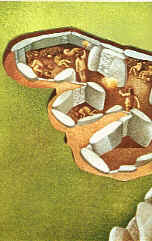 |
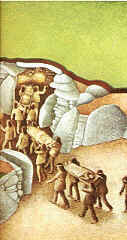 |
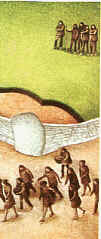 |
** It is certain that all the megalithic monuments were not used as burials, and a few were used at purely cultual purposes because , on 15000 monuments indexed in Western Europe, only 200 include decorated flagstones and give reasons to think that they remained accessible. Moreover, the decorated flagstones are always at the bottom of the tumulus or the dolmen with corridor, which , in fact , makes it a secret, magic place.
*** megalithic art ***
** the decorations, engraved or carved on flagstones and menhirs are not randomly made graffiti , but the remainders of symbolic notations, arrived to us whereas all other ornaments of wood or any other material have disappeared.
** the symbols represented can be:
|
 |
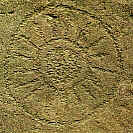 |
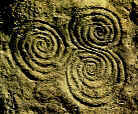 |
 |
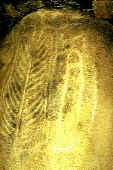 |
| stylized tool very represented
:the axe. Brittany |
part of the body:here ,feet. Brittany . |
a sun or an eye?
Ireland . |
the " triskel ",
spiral with three branches Ireland. |
the goddess - mother Luffang Brittany |
Symbol of fertility Brittany. |
** the difficulty in deciphering the significance of mural engravings is increased owing to the fact that the following generations altered the tombs according to their new habits .
** But let's admire once again the curves, the concentric arcs, the magic volutes which decorate the walls of Gavrinis dolmen in Brittany.
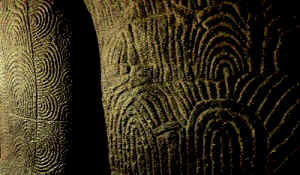
![]()
| Back to Summary |  |
Next : The great Cairn of Barnenez |
| © Odile Prigent - Paleologos 1997-2004 | ||